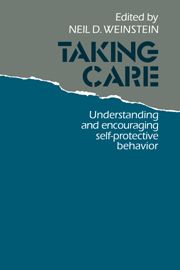Book contents
- Frontmatter
- Contents
- List of contributors
- Acknowledgments
- Introduction: studying self-protective behavior
- I Theoretical perspectives
- 1 Behavioral decision theory perspectives on protective behavior
- 2 Social learning theory and preventive behavior
- 3 The role of emotion and psychological defense in self-protective behavior
- 4 The diffusion of innovations perspective
- 5 Cultural influences on prevention and the emergence of a new health consciousness
- II Research and prevention programs for specific hazards
- III Conclusion
- Index
2 - Social learning theory and preventive behavior
Published online by Cambridge University Press: 03 February 2010
- Frontmatter
- Contents
- List of contributors
- Acknowledgments
- Introduction: studying self-protective behavior
- I Theoretical perspectives
- 1 Behavioral decision theory perspectives on protective behavior
- 2 Social learning theory and preventive behavior
- 3 The role of emotion and psychological defense in self-protective behavior
- 4 The diffusion of innovations perspective
- 5 Cultural influences on prevention and the emergence of a new health consciousness
- II Research and prevention programs for specific hazards
- III Conclusion
- Index
Summary
Introduction
Behavioral science has come to the forefront of public efforts to reduce rates of disease and injury. However, students of human behavior have lacked the unifying theories that have facilitated progress in the so-called hard sciences. Without a sound theoretical foundation, behavioral scientists may find it difficult to meet increasing demands for solutions to societal problems.
Human behavior has resisted scientific study, and comprehensive theories capable of explaining diverse behavioral phenomena have been slow to appear. Significant progress has occurred with the development of Albert Bandura's (1969, 1977a) social learning theory. As the name implies, it is a merging of two distinct theoretical perspectives in academic psychology. Traditionally, proponents of behaviorism, or learning theory, have studied such phenomena as conditioning or reinforcement in the laboratory. They have emphasized the use of quantifiable, physical stimuli and have examined responses by animals and humans in controlled learning situations. In contrast, social psychologists have accumulated a body of theoretical and empirical information on more natural, social influences on behavior, studying such subjective phenomena as values, attitudes, and personality. Albert Bandura synthesized these two traditions by advancing a theory in which behaviorist principles operate in social learning situations through the mediation of simple symbolic and cognitive processes.
Several of the most important concepts of social learning theory are described briefly in the following section. The purpose is to acquaint the reader with the basic features of the theory and with its vocabulary for describing behavioral phenomena.
- Type
- Chapter
- Information
- Taking CareUnderstanding and Encouraging Self-Protective Behavior, pp. 42 - 53Publisher: Cambridge University PressPrint publication year: 1987
- 8
- Cited by

